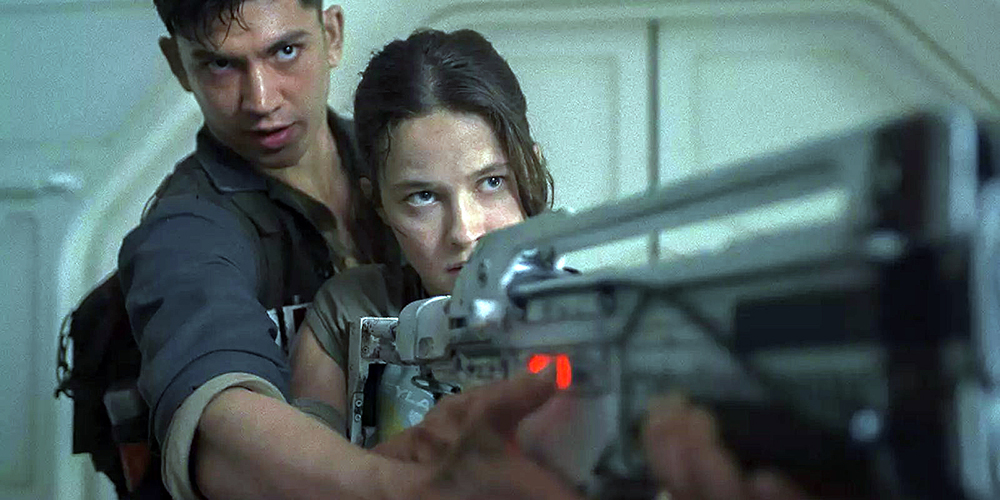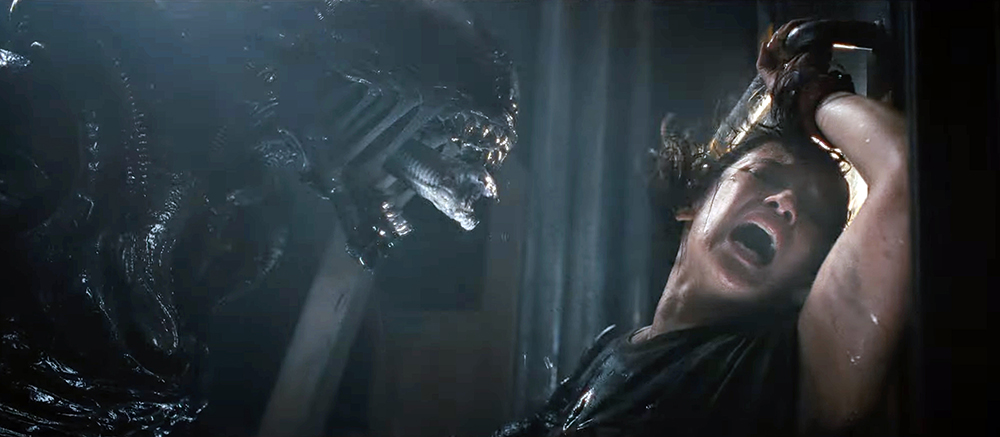One of the things I’ve always loved about Ridley Scott’s seminal sci-fi horror film Alien is that its protagonists are working-class. The crew of the USCSS Nostromo aren’t noble explorers, like in Star Trek, or space wizards and chosen ones, like in Star Wars. They’re not even soldiers, like the crew of the Sulaco in James Cameron’s sequel, Aliens. No, the Nostromo is a cargo tug hauling industrial equipment to a mining colony, and Captain Dallas and Warrant Officer Ripley are basically space truckers. Their dinner conversation is about their contracts, they bicker about working conditions, and no one has any training in what to do if you encounter alien life. That makes their struggle against an invading alien xenomorph all the more desperate, and Ripley’s eventual escape more dramatic.
It also clarifies who the real bad guys are in this scenario. The Weyland-Yutani Corporation time and again chooses a chance to capture and experiment on the extremely dangerous alien xenomorphs over the lives and well-being of their own employees and crew. In Prometheus (2012), it is revealed that the megacorp’s founder Peter Weyland’s search for the secrets of an ancient alien race was actually responsible for unleashing the xenomorphs in the first place.

It takes Captain Dallas’ space truckers a while to figure out that they’re just bait in a Weyland-Yutani bug hunt. In Alien: Romulus, it’s clear from the beginning that the corporation has no one’s best interests at heart, except maybe their shareholders. The film opens with a W-Y probe collecting artifacts from the debris field formerly known as the Nostromo. Then we shift to the surface of a colony planet in orbit around Jackson’s Star, a place so covered in toxic clouds that there is basically no sunlight. Rain (Cailee Spaeny) is an indentured worker, performing dangerous tasks in the planet’s mines. She’s an orphan, but her father left her with Andy (David Jonsson), a Weyland-Yutani brand “synthetic person” who he rescued from the scrap heap and reprogrammed to protect Rain at all costs. She and her adoptive brother are applying for visas to leave the planet, as they have both worked their allotted time to release them from their indenture. But those crafty W-Y execs have updated the terms of service without their knowledge, doubling their terms in the mines because of a labor shortage brought about by her fellow miners’ high mortality rate.
Denied a “legitimate” way off-world, Rain and Andy are forced to try their other option: escape. Rain is reluctant because it means trusting her ex Tyler (Archie Renaux) and his friends Bjorn (Spike Fearn), Navarro (Aileen Wu), and Kay (Isabela Merced) to fly a spaceship. The Corbelan IV is a barely functional bucket of bolts that may or may not get the crew to their destination, Yvaga, a colony where there are actual sunsets. But before they try the nine-year interstellar flight, they need cryosleep chambers. After all, no need to remain conscious for a decade-long commute if you don’t have to.
Yet since the Weyland-Yutani Corp. maintains a monopoly on cryosleep chambers, like what the courts recently ruled Google has in internet search, they can’t just buy them on the open market. (Also, they have no money.) But Tyler and company have a solution. They’ve discovered a derelict ship in orbit around the colony, and it seems to have just enough working cryosleep chambers to get this ragtag crew to freedom. Except for Andy, the android, whose access codes are vital to the heist, but who will have to be scrapped to avoid difficult questions at their destination.
Once Rain decides to roll the dice, the Corbelan IV rendezvous with the target ship, only to find that it is actually a state-of-the-art research space station. They can’t tell why such a valuable asset has been abandoned, but the corp’s accountants have them pulling stuff like this all the time, so it’s not a pressing question — until the party is knee-deep in water in an abandoned cryolab surrounded by hungry aliens. Yes, the reason the Romulus space station was abandoned was because that’s where they brought the xenomorphs for study. Now it’s face-hugger central, and they’re on the menu.
Director Federico Álvarez, who is probably the most famous person from Montevideo, Uruguay, previously helmed the home invasion horror film Don’t Breathe. This excursion into the Alien universe has a similar tense vibe. Our heroes aren’t on a mission from their employer, they’re freebooters, and if they could call for help, it wouldn’t do any good. They are isolated, and must rely on their own ingenuity to escape the ravenous xenomorphs. Álvarez’s biggest advantage with Alien: Romulus is that he has a very tight script, which he co-wrote with frequent collaborator Rodo Sayagues. In past installments of the series, the plot is enabled by some truly stupid behavior on the part of the astronauts, like breaking quarantine to bring unknown alien organisms onto the ship or looking directly into a glowing space egg as it hatches. (I prefer my alien encounters at a safe distance, thank you very much.) At least the crew of the Corbelan IV has the excuse of being amateurs. In fact, as the going gets more dangerous and the xenomorphs more numerous, they come off as a little too competent. Should Rain, who grew up working in the mines, be that handy with a pulse rifle?
But that’s a minor quibble. Alien: Romulus isn’t the product of a visionary mind like Alien, nor a thrilling left turn like Aliens or Prometheus. But it is a tightly executed genre exercise with some memorable images and no shortage of visceral thrills. It’s a working-class film that gets the job done.
Alien: Romulus
Now playing
Multiple locations
